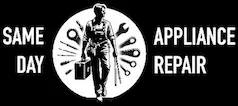Commercial Stove Repair Cost
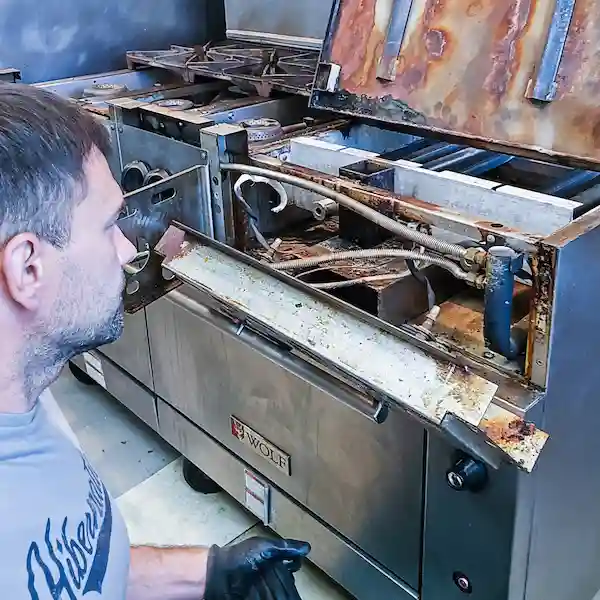
At Same Day Appliance Repair, we are a family-owned business committed to enhancing your customer experience. We understand the frustration of appliance repairs, and we pride ourselves on our transparency and reliability. This page is created to give you a thorough understanding of our pricing policies, the costs associated with a commercial stove repair, and our unique approach to service designed to relieve you of the stress of appliance breakdowns.
We understand the importance of keeping your commercial stove units running efficiently without breaking the bank. We offer competitive pricing tailored to your specific repair needs and guarantee transparent cost estimates with no hidden fees, ensuring you feel comfortable about the affordability of our services.
Have Questions? We're Here to Help!
Feel free to call us if you have any questions. Our team is dedicated to helping you and making sure you're happy.
How Much Does It Cost To Repair a Commercial Stove?
The typical cost to repair a commercial stove varies from $100 to $1200, including parts and labor. The price can vary based on the issue type and your appliance's brand and model. Our technician will first need to diagnose the problem to provide you with the most accurate estimate. Following the diagnosis, you'll receive a detailed price breakdown.
Our Pricing Policy For Commercial Stove Repair And How We Work
There are four costs to consider when making your commercial stove work optimally.
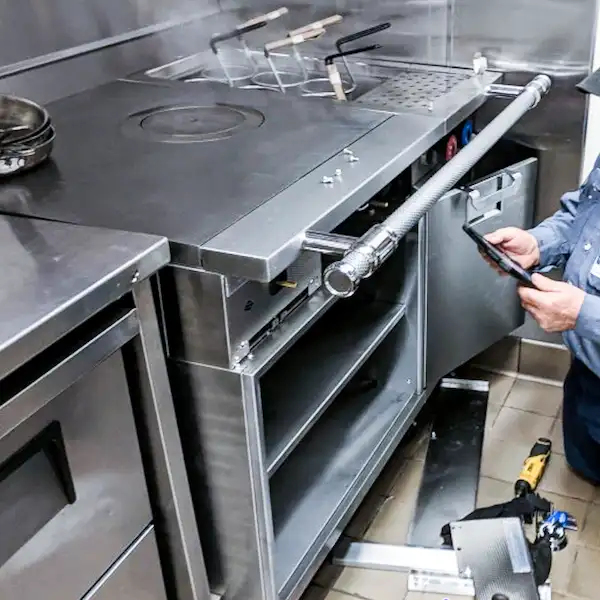
Maintenance Cost
Regular maintenance is essential for your stove's longevity and optimal performance. We recommend annual maintenance, which includes inspecting the nozzles for build-up and replacing the caps, running air through the extinguishing lines to check for blockages, testing the manual pull station to ensure activation, checking pressure gauges and ensuring the gas/electrical shut-off functions work properly, testing the fans for proper operation, cutting the fusible links to simulate heat activation and ensure system engagement; additionally, a professional technician checks for operational integrity and potential issues to prevent future problems. Our flat fee for this comprehensive service is $125 for one stove. If you want our technician to perform maintenance on two or more stoves, the cost will be $80 per unit.
This preventive approach not only saves you money by reducing the need for repairs but also enhances the efficiency and lifespan of your appliance. Schedule your maintenance appointment with us today and ensure your commercial stove runs smoothly.
Service fees
If your commercial stove requires repair, we charge a service fee of $80, which includes a detailed price breakdown. This fee is waived if you choose to proceed with the repair. Unlike some companies, we guarantee you will not pay this fee if we cannot diagnose properly. Our technicians are highly trained and equipped with specialized tools to accurately diagnose and resolve issues, ensuring transparency and fairness in our charges.
Labor cost
See prices below. The cost of labor depends on the complexity of the commercial stove repair and the estimated time required. We ensure transparency by providing a detailed quote before you commit to the service. Should the repair take longer than expected, you won't be charged extra; we waive the diagnostic fee upon proceeding with the repair, and you will pay the cost of the repair and parts if needed.
Replacement Parts
See prices below. While not every repair needs new parts, certain situations require replacement parts to restore your commercial stove to peak performance. Our technicians carry various parts in their vehicles, which usually enables same-day repairs. If a part must be ordered, the cost will vary depending on the repair, brand, and model of your commercial stove.
*We always do our best to find parts at a lower price for our customers. We do not make extra money on the parts; our priority is to make it as easy as possible for the customer.
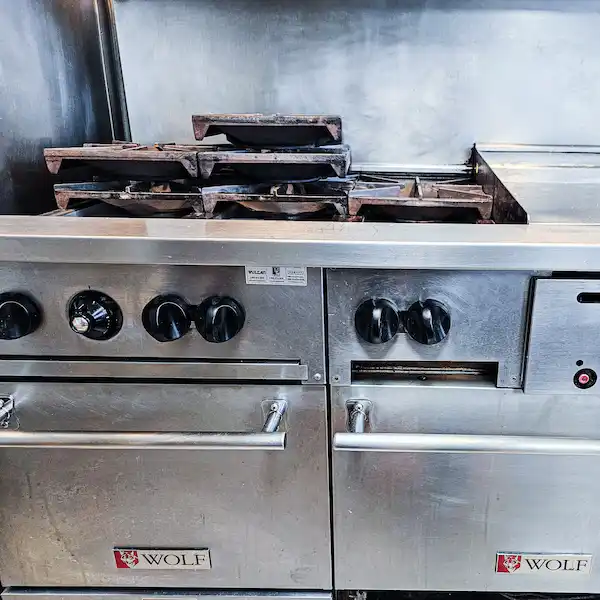
Commercial Stove Repair Cost - Labor Only Excluding Parts
Here are some common problems and price ranges
Burner not igniting, producing uneven flame, or no flame at all.
Burner Issues Replacement Cost - per burner
$100 - $250
Oven not maintaining the set temperature, over or underheating.
Oven Thermostat Replacement Cost
$100 - $300
Oven or burners not igniting, continuous clicking sound.
Ignition System Replacement Cost
$100 - $250
Gas leak, burner not receiving gas or inconsistent gas flow.
Gas Valve Replacement Cost
$150 - $350
Pilot light frequently goes out or fails to light.
Pilot Light Replacement Cost
$100 - $200
Gas not shutting off, excessive gas flow.
Safety Valves Replacement Cost
$150 - $350
Buttons not responding, knobs broken, or display issues.
Control Panel Replacement Cost
$150 - $400
Elements not heating, heating slowly, or uneven heating.
Heating Elements (Electric Stove) Replacement Cost
$100 - $250
The oven door is not closing properly, and heat is escaping from the oven.
Oven Door Hinge or Seal Replacement Cost
$100 - $250
Stove or oven not turning on, frequent electrical tripping.
Electrical Issues Replacement Cost
$150 - $400
Fan not operating, noisy operation, or inefficient heating.
Convection Fan Replacement Cost (in Convection Ovens)
$100 - $300
Uneven heating, surface damage or deterioration.
Griddle Surface Replacement Cost
$150 - $350
Broiler not heating, uneven cooking.
Broiler Components Replacement Cost
$100 - $300
Commercial Stove Replacement Parts Cost
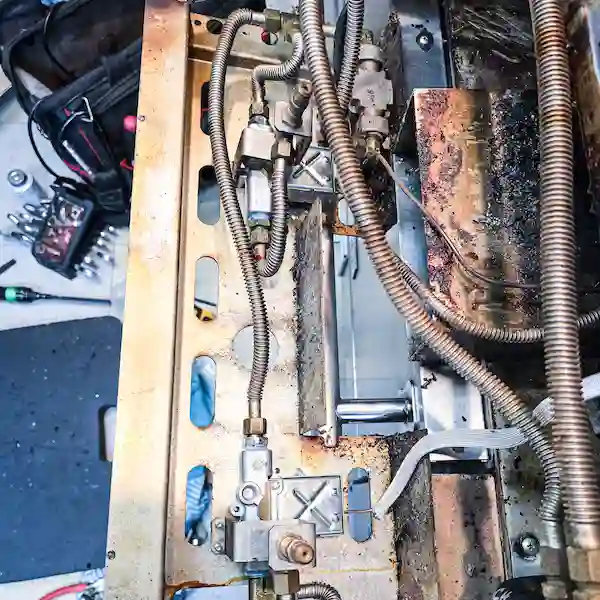
Replacement burners are necessary when the originals fail to ignite or produce an uneven flame.
Burners - each
$50 - $300
Essential for regulating the oven's temperature.
Oven Thermostat
$100 - $300
Includes igniters, spark modules, and other components related to starting the stove.
Ignition System Parts
$30 - $150
$100 - $400
Small flames that ignite the main burner; need replacing if they frequently extinguish.
Pilot Lights
$20 - $100
$150 - $350
Interface for controlling stove functions; can wear out or become unresponsive.
Control Panels and Knobs
$50 - $250
Heat the cooktop and oven in electric models.
Heating Elements (Electric Stoves) - each
$40 - $200
Ensure the oven door closes properly to retain heat and operate efficiently.
Oven Door Hinges and Seals
$50 - $150
Includes wiring, fuses, and circuit boards.
Electrical Components
$50 - $400
Drive the fans in convection ovens for even heat distribution.
Convection Fan Motors
$100 - $300
$200 - $800
Provide intense heat from above for broiling food.
Broiler Elements
$100 - $300
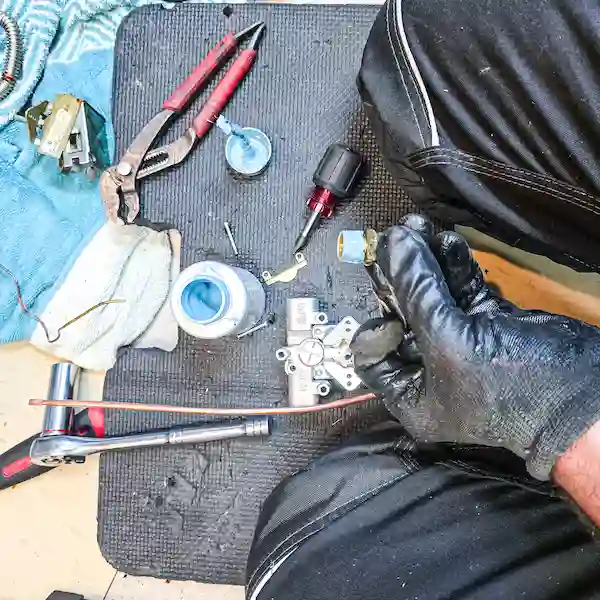
What is Included in the Annual/Semi-annual Commercial Stove Maintenance
- Inspecting the nozzles for build-up and replacing the nozzle caps
- Running air through the extinguishing lines to check for blockages
- Testing the manual pull station to ensure it activates the system
- Checking the pressure gauges and ensuring the gas/electrical shut-off functions work properly
- Testing the fans to ensure they are operating as designed
- Cutting the fusible links to simulate heat activation and ensuring the system engages
Additionally, the restaurant owner or kitchen manager should perform a basic monthly visual inspection of the kitchen hood system to check for grease buildup, damage, and other issues.
Regular cleaning of the kitchen hood, filters, and nozzles is also recommended, with high-volume kitchens needing this done weekly or bi-weekly to prevent grease buildup that can impair the fire suppression system.
In summary, the key elements of annual/semi-annual commercial stove maintenance include professional fire suppression system inspections, monthly visual checks, and frequent cleaning of the kitchen hood and components.
FAQs
Which brands of commercial stoves do you repair?
We repair all major commercial stove brands:
- Wolf
- Vulcan
- Garland
- Cookline
and more, just call us, and we will do our best to maintain your stove's peak performance.
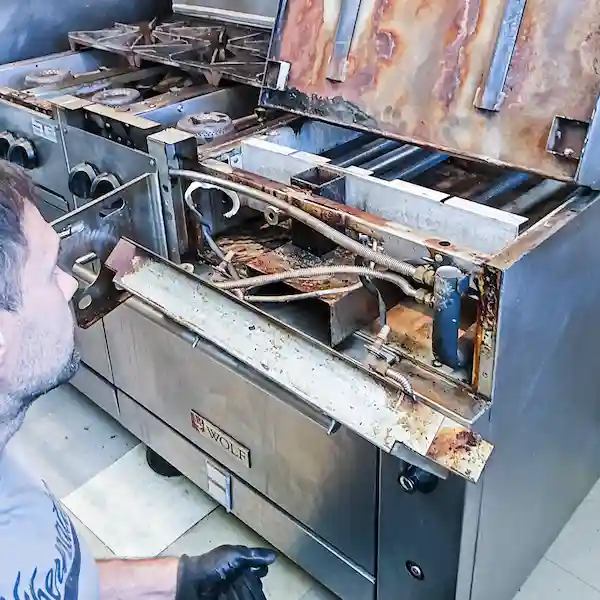
What are the benefits of semi-annual commercial stove maintenance?
Semi-annual maintenance of commercial stoves significantly enhances workplace safety by ensuring kitchen fire suppression systems function correctly during emergencies, thereby reducing the risk of kitchen fires. Regularly replacing worn parts and cleaning components helps avoid equipment malfunctions that could pose safety hazards. This routine care also supports consistent food quality by maintaining proper cooking and holding temperatures, and by preventing grease buildup which could otherwise impact the performance of cooking equipment like gas ovens and affect food preparation.
Furthermore, proactive maintenance reduces the likelihood of unexpected breakdowns in appliances such as ovens and stoves, thus boosting kitchen productivity and allowing staff to focus more on customer service rather than on appliance repairs. Early detection of issues during these maintenance checks helps prevent minor repairs from escalating into more costly repair scenarios, ultimately keeping repair costs lower and extending the lifespan of the equipment.
By adhering to a maintenance schedule, businesses can avoid unnecessary repairs and ensure their gas ovens, electric ovens, and other kitchen appliances last longer, providing a cost-effective solution to managing commercial kitchen operations. Additionally, well-maintained equipment meets manufacturer recommendations, optimizing performance and delaying the need for expensive replacements such as new ovens or other new appliances, thus maximizing return on investment. This practice not only saves money but also ensures compliance with safety standards, necessitating filing of inspection certifications with local authorities to maintain operational permissions.
What are the common issues that commercial stove maintenance can prevent?
Regular maintenance of commercial stoves is crucial to prevent several common issues that could lead to costly repairs, reduced efficiency, and safety risks in a commercial kitchen. Here, we explore the key concerns that routine maintenance aims to address:
- Grease and Food Buildup: Without consistent cleaning, stovetops can accumulate burnt-on grease and food particles, making them difficult to clean and potentially harboring bacteria that can degrade food quality.
- Equipment Malfunctions: Neglected maintenance can lead to various problems such as clogged drains, limescale, and excessive grease, which impair the functionality of cooking equipment. This neglect can also lead to premature failure of components and unexpected breakdowns, escalating repair costs.
- Fire Hazards: Accumulated grease in kitchen hoods and exhaust systems significantly heightens the risk of fires. Additionally, poorly maintained ovens and stoves with faulty heating elements or gas leaks are more prone to causing fires.
- Reduced Lifespan of Equipment: Regular upkeep is essential to extend the lifespan of commercial kitchen appliances. Proactive maintenance ensures that ovens, stoves, and other equipment continue to operate efficiently, maximizing the investment made in these costly appliances.
- Food Quality and Safety Issues: Inconsistent oven temperatures and unclean cooking surfaces can lead to unevenly cooked food, which not only affects taste and quality but also poses food safety risks.
By implementing a regular maintenance schedule, businesses can avoid the pitfalls of appliance malfunctions and ensure their cooking equipment remains reliable. This preventive approach not only helps with efficient kitchen operations but also keeps appliance repair costs manageable. Regular checks and maintenance can prevent the need for emergency repairs or the premature replacement of expensive items like gas ovens and electric ovens.
Moreover, addressing issues such as faulty oven doors, malfunctioning control panels, or ineffective safety valves during routine maintenance can significantly reduce the risk of downtime in the kitchen, ensuring that service remains smooth and professional. By investing in regular maintenance, businesses can provide more reliable service, potentially extending warranties and avoiding unnecessary repairs, thus saving money in the long term.
What are the best practices for commercial stove maintenance?
Maintaining a commercial stove involves several best practices that not only enhance the safety and efficiency of the kitchen but also help manage repair costs effectively. Here are the key strategies:
- Regular Cleaning: Immediate cleanup of spills is crucial to prevent the buildup of food and grease, which can later complicate cleaning efforts and increase the potential for fire hazards. Components such as burner covers, drip trays, and control knobs should be soaked in hot soapy water to dissolve grease, followed by a scrub using steel wool or a degreaser spray. Ensuring these parts are dry before reassembly prevents moisture-related issues. Monthly deep cleaning behind the stove and on adjacent walls is also recommended.
- Inspecting and Maintaining Safety Systems: To avoid costly repairs and ensure operational safety, it's vital to engage a licensed fire protection company to inspect the kitchen's fire suppression system biannually. Regular checks should include verifying the functionality of nozzles, pressure levels, and the activation mechanisms of gas and electrical shut-offs. A monthly visual inspection of the hood system for grease accumulation is also advisable.
- Preventing Equipment Malfunctions: Keeping fuel ports and drains clear is essential to prevent malfunctions that could lead to extensive appliance repair costs. Using a combination of ammonia, baking soda, and hydrogen peroxide can effectively remove stubborn stains and contaminants, maintaining the efficiency of the stove.
- Extending Equipment Lifespan: Following the manufacturer's maintenance schedule and opting for a preventative maintenance program can help detect and address issues early, thereby extending the stove's lifespan. It is also important to avoid harsh abrasives that can damage the stove's surfaces.
- Ensuring Food Safety and Quality: A clean stove top and surrounding areas help prevent bacteria growth, ensuring food safety. Proper equipment maintenance also supports consistent cooking temperatures, crucial for food quality.
Adopting these practices not only helps in reducing downtime and appliance repair costs but also enhances the overall efficiency of commercial kitchen operations. Regular maintenance checks and addressing minor repairs promptly can prevent more significant issues down the line, making it a cost-effective strategy for managing commercial stoves and other related appliances.
What are the signs that a commercial stove needs maintenance?
To ensure the optimal functioning of commercial stoves and manage repair expenses effectively, it's crucial to recognize the signs that indicate the need for maintenance. Here are some key indicators:
- Buildup of Grease and Food Residues: The presence of visible grease, food particles, and burnt-on debris on and around the stove, including gas ovens and electric ovens, signifies the need for thorough cleaning. If these residues are difficult to remove, it could lead to more significant issues requiring professional appliance repair services.
- Component Malfunctions: Issues such as burners that fail to ignite properly, inconsistent heating, clogged fuel ports, and unusual noises indicate that the stove's components may be malfunctioning. These problems not only affect the stove's efficiency but could also lead to costly repairs if not addressed promptly.
- Decreased Cooking Efficiency: If you notice that the stove takes longer to heat up or the oven repairs are becoming frequent due to uneven heating or increased energy consumption, these are signs of reduced efficiency. This could be due to failing heating elements or issues with the control board.
- Safety Hazards: A significant safety concern is the accumulation of grease in the exhaust systems, which increases the risk of fire. Other safety-related issues include malfunctioning safety valves, gas leaks, and worn or damaged parts such as the oven door or control panel. These require immediate attention to prevent hazardous situations.
- Visible Wear and Tear: Signs of wear such as discoloration, scratches, dents, and loose or missing components like knobs or burner covers, often indicate that the stove is due for maintenance or repairs. Regular checks can help identify these problems early, potentially saving on higher repair costs later.
Addressing these signs through routine maintenance not only helps in avoiding unexpected stove repair costs but also extends the life of the appliance. It ensures that the kitchen remains a safe, efficient, and productive environment. Engaging reliable service from experienced appliance repair technicians can help manage these maintenance tasks effectively, ensuring that your commercial stove operates at its best.
Is it worth fixing a commercial stove?
When it comes to commercial stove repair, understanding the costs and factors involved is essential for maintaining your kitchen's efficiency and safety. Here are some critical aspects and terms related to stove and oven repairs:
- Appliance Repair Costs: Repairing a commercial stove can vary widely depending on the issue. Common repairs include fixing the heating elements, oven door, control board, and safety valves. The cost to repair can be influenced by the severity of the problem and the parts required.
- Oven and Stove Repairs: Issues might range from simple to complex, from replacing a malfunctioning oven thermostat or pilot light to more significant repairs like addressing gas leaks or control panel malfunctions. Each repair type has different implications for cost and downtime.
- DIY Appliance Repair vs. Professional Service: While some minor repairs might seem manageable through DIY approaches, commercial appliances often require professional appliance repair services due to their complexity and the need for specialized tools and knowledge. Engaging a skilled appliance repair technician is advisable to ensure safety and efficiency.
- Gas Ovens and Electric Ovens: The type of oven—whether gas or electric—can affect the nature of the repairs needed. Gas ovens might need attention to gas supply and pilot lights, whereas electric ovens frequently suffer from issues with heating elements and electronic controls.
- Repair or Replace: Deciding whether to repair or replace can depend on the stove repair costs. If frequent repairs are needed or the cost of a single repair approaches or exceeds half the price of a new appliance, it might be more cost-effective to invest in a new oven.
- Preventive Maintenance: Regular checks and maintenance can prevent costly repairs and extend the life of the appliance. This includes cleaning to prevent buildup that could lead to fires and checking for common wear and tear.
- Warranty and Service Fees: Always consider the warranty of your appliance. Some repairs might be covered under the manufacturer's warranty or an extended warranty plan. However, be mindful of service fees that may apply even when the repair is covered by warranty.
- Geographic Location: The cost of appliance repairs can also vary by geographic location due to differences in the cost of living and the availability of service providers.
In summary, managing repairs for commercial stoves involves considering the nature of the malfunction, deciding between DIY repairs and professional help, assessing whether to repair or replace the appliance, and understanding the potential costs involved. Regular maintenance and timely repairs are crucial for the longevity and efficiency of commercial stoves.
Do You Repair Home Appliances?
Yes, we repair all kinds of Home and commercial appliances.
How Long Does It Take to Repair a Commercial Stove?
The time required to repair a commercial stove can vary considerably based on the specific issues and the type of stove (gas or electric). For a gas oven, issues can range from a malfunctioning safety valve to problems with the control board, which typically dictate the complexity and length of the repair. Gas appliance repairs might involve addressing issues with the oven's heating element or the gas flow, which can take anywhere from 2 to 5 hours.
On the other hand, an electric oven repair might involve fixing or replacing the heating element, control board, or other electrical components. Such repairs could take anywhere from 0.5 to 12 hours, depending on the severity of the issue and the availability of replacement parts.
When considering oven repairs, it's also important to factor in the oven repair cost, which includes both the appliance repair cost and potentially high replacement costs for parts like the control board and heating elements. Engaging a professional appliance repair service is advisable to ensure safety and the effective resolution of issues.
Moreover, for commercial settings where downtime equals lost revenue, the efficiency of the repair service becomes even more critical. Some oven repairs might be straightforward, like replacing a broken latch or lid switch, while others, such as issues with steam ovens or a compromised oven temperature control, could be more complex.
Before deciding on repairing appliances, it's essential to compare the repair cost against the replacement costs and consider factors like extended warranties and manufacturer warranties, which might influence the decision. Sometimes, for older or frequently malfunctioning appliances, the average costs of continuous repairs might suggest that replacement is a more economical and reliable option.
In summary, the duration of commercial stove repairs can be quite variable, influenced by the type of oven, the nature of the malfunction, and the efficiency of the repair service. It's crucial to weigh the appliance repair cost, potential downtime, and the long-term benefits of the appliance's continuous functionality against the cost and benefits of purchasing a new unit.
What Are The Most Common Commercial Oven Repairs?
The most common commercial oven repairs often revolve around issues that impact both the efficiency and the safety of the appliance. Here are key areas that frequently need attention:
- Heating Element: In most ovens, whether gas or electric, the heating element is crucial for proper function. Malfunctions here can lead to uneven cooking or the oven failing to heat at all. Replacing or repairing heating elements is a common oven repair.
- Control Boards: Modern ovens rely on electronic control boards for setting temperatures and cooking times. Issues with control boards are frequent in both built-in models and other appliances. Faulty control boards can lead to inaccurate oven temperatures and malfunctioning timers.
- Safety Valve: Particularly in gas ovens, the safety valve is vital for controlling the flow of gas and preventing leaks, which could pose serious safety risks, including the potential for fires or explosions.
- Gas Appliances Specific Issues: For gas ovens and ranges, common repairs might also include fixing igniters or addressing gas leaks. These are critical repairs as they also relate to safety.
- Steam Oven Components: In commercial kitchens where steam ovens are used, components specific to generating and controlling hot air and steam often require maintenance or replacement to ensure the food is cooked thoroughly and safely, avoiding issues like food poisoning.
- Glass Stovetop or Tempered Glass: For ovens with a glass cooking surface, damage to the glass stovetop is a common issue. Whether due to accidental impacts or thermal stress, replacing this tempered glass can be among the necessary repairs.
- Replacement Part Costs: Often, the decision on whether an oven is worth repairing hinges on the cost of replacement parts. Components like safety valves, control boards, and heating elements can vary widely in price, which affects the overall oven repair cost.
Most repairs in commercial settings are prioritized based on the potential to save money on energy costs and the necessity of keeping the kitchen operational without compromising safety. Repair prices can vary, but ensuring a professional service handles these repairs is essential, as DIY fixes can lead to further damage or safety hazards.
What are common issues and considerations in repairing commercial stoves, particularly gas ovens, in restaurants and food service establishments?
Commercial stove repair is a critical service for restaurants and other food service establishments to keep their kitchens running efficiently. When it comes to repairing a commercial stove, certain repairs are more common and sometimes more urgent due to the integral role the appliance plays in daily operations.
One frequent issue that requires oven repair is the malfunctioning of gas ovens. These types of repairs can range from minor adjustments to more significant repairs like replacing the gas flow mechanisms or fixing temperature control issues. Given that a gas oven is essential for cooking and baking, timely and effective repairs are crucial to prevent downtime and ensure the continuity of kitchen operations.
Repair prices for commercial stoves can vary widely depending on the extent of damage and the parts required. For instance, replacing a simple component might be relatively inexpensive, but more complex issues, such as those involving the stove's control systems or a connected water heater, could be costlier. The water heater, often used in conjunction with commercial kitchen equipment for cleaning and cooking processes, might also need periodic maintenance or repair, adding to the overall service cost.
When scheduling repairs, it's important for businesses to consider the urgency and scope of the work. Some repairs might be urgent due to safety concerns or operational needs, while others might be planned as part of regular maintenance to ensure the longevity and efficiency of the equipment.
Overall, understanding the nature of oven repair, especially for gas ovens, and being aware of the potential repair prices helps businesses budget accordingly and minimize kitchen downtime. Ensuring that all components, including any associated water heater systems, are in good working condition is essential for a smooth-running kitchen.
Do You Install New Stoves?
Yes, we can install any new appliance you purchase.
